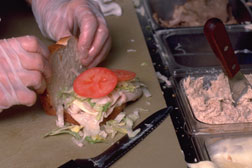 (Journal of Supply Chain Management: Clemson, North Carolina) -- A new study from the Journal of Supply Chain Management illustrates the real potential for contamination of globally sourced foods and proposes a conceptual framework of supply chain quality management.Led by Aleda V. Roth of Clemson University, the study utilized information from trends of U.S. food imports from China, subsequent recall events, and U.S. Food and Drug Administration (FDA) data to highlight the inherent difficulties and risks posed by global food supply chains.
(Journal of Supply Chain Management: Clemson, North Carolina) -- A new study from the Journal of Supply Chain Management illustrates the real potential for contamination of globally sourced foods and proposes a conceptual framework of supply chain quality management.Led by Aleda V. Roth of Clemson University, the study utilized information from trends of U.S. food imports from China, subsequent recall events, and U.S. Food and Drug Administration (FDA) data to highlight the inherent difficulties and risks posed by global food supply chains. Various quality problems have been associated with foods and ingredients imported from China. There exists limited capacity of current regulatory bodies to police product flows, including lack of enforcement by the FDA. Problems often arise when pursuit of profit isn’t held in check by regulatory forces, resulting in noncompliance with laws and standards, and even corruption. These problems have led to contamination of Chinese-made products.
How should these challenges be handled? Roth says that “adding on inspections and stricter regulations alone may be neither sustainable nor effective in the long run.”
…
Add new comment